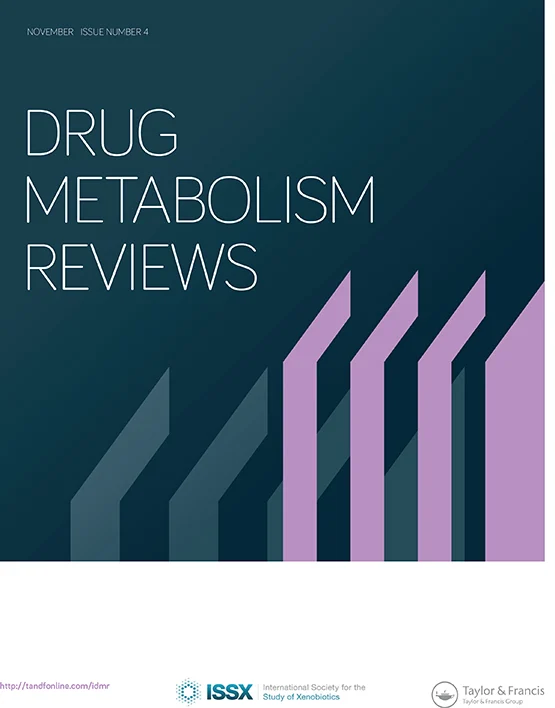Effects of Cannabidiol and Δ9-Tetrahydrocannabinol on Cytochrome P450 Enzymes: A Systematic Review.
IF 3.4
2区 医学
Q2 PHARMACOLOGY & PHARMACY
引用次数: 0
Abstract
Due to legal, political, and cultural changes, the use of cannabis has rapidly increased in recent years. Research has demonstrated that the cannabinoids cannabidiol (CBD) and Δ9-tetrahydrocannabinol (THC) inhibit and induce cytochrome P450 (CYP450) enzymes. The objective of this review is to evaluate the effect of CBD and THC on the activity of CYP450 enzymes and the implications for drug-drug interactions (DDIs) with psychotropic agents that are CYP substrates. A systematic search was conducted using PubMed, Scopus, Scientific Electronic Library Online (SciELO) and PsychINFO. Search terms included 'cannabidiol', 'tetrahydrocannabinol and 'cytochrome P450'. A total of seven studies evaluating the interaction of THC and CBD with CYP450 enzymes and psychotropic drugs were included. Both preclinical and clinical studies were included.Results from the included studies indicate that both CBD and THC inhibit several CYP450 enzymes including, but not limited to, CYP1A2, CYP3C19, and CYP2B6. While there are a few known CYP450 enzymes that are induced by THC and CBD, the induction of CYP450 enzymes is an understudied area of research and lacks clinical data. The inhibitory effects observed by CBD and THC on CYP450 enzymes vary in magnitude and may decrease the metabolism of psychotropic agents, changes in plasma levels of psychotropic medications, and increase adverse effects. Our findings clearly present interactions between THC and CBD and several CYP450 enzymes, providing clinicians evidence of a high risk of DDIs for patients who consume both cannabis and psychotropic medication. However, more clinical research is necessary before results are applied to clinical settings.大麻二酚和Δ9-四氢大麻酚对细胞色素 P450 酶的影响:系统综述。
由于法律、政治和文化的变化,近年来大麻的使用量迅速增加。研究表明,大麻素大麻二酚(CBD)和Δ9-四氢大麻酚(THC)可抑制和诱导细胞色素 P450(CYP450)酶。本综述旨在评估 CBD 和 THC 对 CYP450 酶活性的影响,以及与作为 CYP 底物的精神药物之间的药物相互作用 (DDI) 的影响。我们使用 PubMed、Scopus、科学电子图书馆在线(SciELO)和 PsychINFO 进行了系统检索。搜索关键词包括 "大麻二酚"、"四氢大麻酚 "和 "细胞色素 P450"。共纳入了七项评估四氢大麻酚和大麻二酚与 CYP450 酶和精神药物相互作用的研究。纳入的研究结果表明,CBD 和 THC 都会抑制多种 CYP450 酶,包括但不限于 CYP1A2、CYP3C19 和 CYP2B6。虽然有一些已知的 CYP450 酶会被 THC 和 CBD 诱导,但 CYP450 酶的诱导是一个研究不足的领域,缺乏临床数据。CBD 和 THC 对 CYP450 酶的抑制作用大小不一,可能会降低精神药物的代谢、改变精神药物的血浆水平并增加不良反应。我们的研究结果清楚地显示了四氢大麻酚和生物柴油与几种 CYP450 酶之间的相互作用,为临床医生提供了同时服用大麻和精神药物的患者发生 DDI 的高风险证据。不过,在将研究结果应用于临床之前,还需要进行更多的临床研究。
本文章由计算机程序翻译,如有差异,请以英文原文为准。
求助全文
约1分钟内获得全文
求助全文
来源期刊

Drug Metabolism Reviews
医学-药学
CiteScore
11.10
自引率
1.70%
发文量
21
审稿时长
1 months
期刊介绍:
Drug Metabolism Reviews consistently provides critically needed reviews of an impressive array of drug metabolism research-covering established, new, and potential drugs; environmentally toxic chemicals; absorption; metabolism and excretion; and enzymology of all living species. Additionally, the journal offers new hypotheses of interest to diverse groups of medical professionals including pharmacologists, toxicologists, chemists, microbiologists, pharmacokineticists, immunologists, mass spectroscopists, as well as enzymologists working in xenobiotic biotransformation.
 求助内容:
求助内容: 应助结果提醒方式:
应助结果提醒方式:


